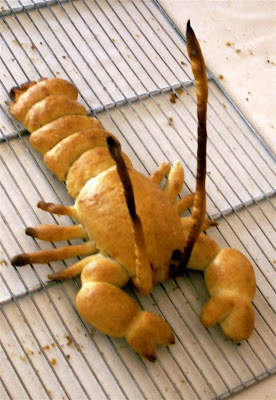Many took offense at my assertion in my Bitten post that “Taking the life of an animal for food is a morbid, ironic affirmation that we are alive.” I admit that, as Luke put it on Bitten, "that entire paragraph about meat, culture, and tempeh is a bit muddled.” This is in part because, of all the discoveries I've made about meat, this is the one that I find most difficult to articulate. It has much to do with the symbolism of meat, its sacrificial connotations. I find an emotional charge in sharing meat with others that comes from the fact that an animal had to die for our meal - the stakes are higher, as it were, when you're eating steak. Certain vegans replied that they sense a higher bond in sharing a vegetarian meal with other vegetarians, which is certainly valid, but I must admit that tapping into the tradition of eating meat has been more intense and rewarding than I expected. However, this is meant to be an experiential observation, not a moral defense of meat.
I was surprised by the outrage expressed on a forum on the vegan site Post Punk Kitchen, mostly because I think, ideologically, I have more in common with vegans than with meat-eaters. Many objected to what they see as hypocrisy; as mollyjade wrote on Post Punk Kitchen, "The blog is one post after another of 'I ate X, here are all the reasons not to eat X.'" It's a pithy summary, but, in my defense, I've been trying to look at meat from a variety of standpoints - moral, culinary, social, psychological. I prefer to think that the self-contradictions on this blog are a result of the complexity of the issue at hand rather than insincerity on my part.
Over on Bitten, Audrey commented, "Faced 'temporarily' with peer pressure, you've compromised conviction, and animals pay the price." I am sorry that some see this experiment as a compromise or a betrayal. Certain vegetarians see the "exploitation" of animals for food as an absolute wrong, which is their prerogative, even if it's not an opinion I share. I think that more good will come from trying to understand the reasons for which people eat meat than from dismissing them entirely. (And I appreciate the more nuanced view of the Erik Marcus at vegan.com, though I wouldn't call this experiment a "mistake" so much as a learning experience.)
I've been charged with other offenses, too: naïveté, narcissism, elitism, stupidity. Perhaps some of these accusations are not entirely without basis, but be kind, please: I am relatively young (though I don't think this fact automatically invalidates my opinions, as some seem to think), I am practicing my writing, and I am trying to find an appropriate balance between the personal and the political in what I write. In any case, no one is obligated to read this blog if they find it to be drivel.
There are also comments in such a low register that responding seems futile. (Although to the person on Post Punk Kitchen who called me "an arrogant bisque," I will say: I welcome your corny puns, sir, but I'm probably not the only one who wishes you would leave your casual sexism at home.)
But I'm always up for a discussion of ideas, so thank you to everyone who has responded thoughtfully and eloquently. You've given me a lot to think about, and I hope to sort my thoughts out and write more about it here in the near future. And by all means, let's continue the dialogue.






